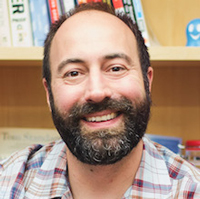Picture a small park across the street from your home. Normally filled with the sounds of children laughing and playing, it’s now a dedicated zone for drones zipping through the air. One day, a malfunctioning drone spirals out of control and crashes through your window.
This is the kind of scenario Professor Ryan Calo asked his students to envision in a series of design challenges during his spring course INFO 198: Technology, Policy, and Ethics. During design-challenge week, students received two prompts to design around. The first prompt asked students to design a drone park while taking into account who would be affected by it.
Calo gathered inspiration for such practical value-sensitive design exercises from Associate Professor David Hendry’s tech policy education modules and Associate Professor Alexis Hiniker’s “design for evil” course (INFO 356) in which students examine manipulative interfaces and develop solutions countering such technology.
Through the course, Calo hopes to introduce students interested in pursuing Informatics to the core concepts of law, ethics and policy that intersect with technology. Among those key concepts is value-sensitive design, a theoretical approach that considers and respects the values of all those who will be affected by the creation of a technology.
“The design project is a great way to create using the knowledge I've gained in class and stretch my thinking in a low-pressure environment,” said intended Informatics major Ryan Tan.
The second prompt asked students to design an Internet of Things from the perspective of an evil entity like a totalitarian government or greedy corporation. In the second portion of this exercise, students shared their designs with the class and came up with a series of laws and rules that prevent harms such as the violation of user privacy rights or the illicit collection and selling of data.

“The idea behind this exercise is to extrapolate from worst-case scenarios to develop policy and legal guardrails that society can impose so that potential evil actors can’t perpetuate such harm in reality,” said Calo.
In the course, students were divided into groups to brainstorm an "evil" scenario and develop solutions for it. One group imagined a large pharmaceutical corporation manipulating smart home appliances for targeted marketing. Among these evil appliances, the students envisioned a smart laundry system that subtly grows or shrinks clothing to influence users' self-perception, making them more susceptible to ads for weight-loss products or dietary supplements. To address this, the group proposed a series of laws and regulations, including requirements for smart appliances to classify and protect personal data, and a ban on corporations altering customers' environments through technology unless the customers are direct stakeholders.
The course aims to equip students with the tools to interact with and analyze technology in the real world to be more conscious users.
“This class was very informative and helpful in developing my understanding of society and technology,” said Malik Messiah, a third-year student intending to major in Informatics. “Professor Calo was successful in creating a collaborative and inclusive environment where there is no such thing as a bad question. He made sure to connect every contribution from students back to the course material and used it as a learning opportunity for the larger class.”
“Professor Calo creates a very fun and engaging classroom environment but the best part about the way that he has structured the classroom is that we all learn collectively,” said teaching assistant and Informatics student Thea Klein-Balajee.
The design challenges in INFO 198 are just one example of the ways Calo encourages students to imagine more ethical and equitable information technology and systems creatively.
“This class with Professor Calo and hearing the ideas and takeaways that my peers have had throughout the course has been fundamental in broadening my understanding of technology, policy, and law,” said Susruthi Karanam, an intended Informatics student.
